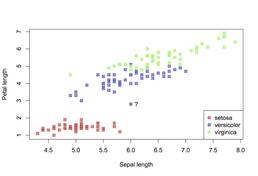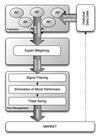Machine learning

Even amongst practitioners, there is no truly well accepted definition for machine learning. So, I’ll to provide two:
- Pioneer machine learning researcher Arthur Samuel defined machine learning as: “the field of study that gives computers the ability to learn without being explicitly programmed”. This definition is beautiful in its simplicity though lacks a little formality. So, with a little more structure,..
- Tom Mitchell states that “a computer program is said to learn from experience E, with respect to some task T, and some performance measure P, if its performance on T as measured by P improves with experience E”.
A classic practical application is the email spam filter. The email program watches which emails the user does or does not mark as spam and, based on that, learns how to better filter future spam automatically. In the parlance of Tim Mitchell’s definition, classifying the emails as spam or not span is the task, T, watching the user label emails as spam or not spam is the experience, E, and the fraction emails correctly classified could be the perform measure, P.
There are a great number of machine learning algorithms and, as such, they are often divided into three main types: supervised, unsupervised and reinforcement learning algorithms.
For queries about this topic, contact Ash Booth.
View the calendar of events relating to this topic.
Projects

Automated Algorithmic Trading with Intelligent Execution
Frank McGroarty, Enrico Gerding (Investigators), Ash Booth
In this project, we introduce the first fully automated trading system for real-world stock trading that uses time-adaptive execution algorithm to minimise market impact while increasing profitability com- pared to benchmark strategies.

Automated Trading with Performance Weighted Random Forests and Seasonality
Frank McGroarty, Enrico Gerding (Investigators), Ash Booth
This project proposes an expert system that uses novel machine learning techniques to predict the price return over these seasonal events, and then uses these predictions to develop a profitable trading strategy.

Automatic Image Retrieval with Soft Biometrics for Surveillance
Mark Nixon, John Carter (Investigators), Daniel Martinho-Corbishley
We're investigating ways to automatically describe and identify pedestrians from surveillance footage using human understandable, soft biometric labels. Our goal is to enable surveillance operators to search for pedestrians in a video network using soft biometric descriptions, and to automatically retrieve these descriptions from CCTV images.
BRECcIA - Building REsearch Capacity for sustainable water and food security In sub-saharan Africa
The BRECcIA project is aimed at developing research and researchers to understand water and food security challenges in sub-Saharan Africa

Centre for Doctoral Training in Next Generation Computational Modelling
Hans Fangohr, Ian Hawke, Peter Horak (Investigators), Susanne Ufermann Fangohr, Thorsten Wittemeier, Ashley Setter, Kieran Selvon, Hossam Ragheb, Craig Rafter, Alvaro Perez-Diaz, Ryan Pepper, David Lusher, Stephen Gow, James Harrison, Paul Chambers, Jan Kamenik, Ioannis Begleris, Robert Entwistle, Jonathon Waters, Rory Brown, Joshua Greenhalgh, Emanuele Zappia
The £10million Centre for Doctoral Training was launched in November 2013 and is jointly funded by EPSRC, the University of Southampton, and its partners.
The NGCM brings together world-class simulation modelling research activities from across the University of Southampton and hosts a 4-year doctoral training programme that is the first of its kind in the UK.

Deep Optimisation
Jamie Caldwell
The project will develop the implementation and application of a new optimisation technique. 'Deep optimisation' combines deep learning techniques in neural networks with distributed optimisation methods to create a dynamically re-scalable optimisation process. This project will develop this technique to better-understand its capabilities and limitations and develop GPU implementations. The protein structure prediction problem will be used as the main test application.

Development and application of powerful methods for identifying selective sweeps
Andrew Collins, Reuben Pengelly, Timothy Sluckin, Sarah Ennis (Investigators), Clare Horscroft
This project is about detecting regions of the genome which have experienced selective pressure. To achieve this, mathematical models will be developed and applied to human genomic data sets, as well as to those of other species.
Genetic studies to characterise the role of genetic factors in early-onset breast cancer
Andrew Collins (Investigator), Rosanna Upstill-Goddard
Breast cancer is a highly heterogeneous disease, with many distinct subtypes. In the majority of breast cancer cases the causative genetic component is poorly characterised. This study aims to explore both rare and common mutations in early-onset breast cancer patients and the contribution of such variants to disease using a variety of analytic approaches.

Mathematical tools for analysis of genome function, linkage disequilibrium structure and disease gene prediction
Mahesan Niranjan, Andrew Collins, Reuben Pengelly (Investigators)
This iPhD project uses a Gaussian Bayesian Networks framework through Machine learning methods to predict which genes are involved in the development of different diseases.

Mathematical tools for analysis of genome function, linkage disequilibrium structure and disease gene prediction
Andrew Collins, Mahesan Niranjan, Reuben Pengelly (Investigators), Alejandra Vergara Lope
This iPhD project uses a Gaussian Bayesian Networks approaches framework through machine learning approach to predict which genes are involved in the development of different diseases.

Mathematical tools for analysis of genome function, linkage disequilibrium structure and disease gene prediction
Mahesan Niranjan, Andrew Collins, Reuben Pengelly (Investigators)
This PhD project uses a Monte Carlo molecular simulation processes approach to predict which genes are involved in the development of different diseases.

New Forest Cicada Project
Alexander Rogers, Geoff Merrett (Investigators), Davide Zilli, Oliver Parson
Rediscover the critically endangered New Forest cicada with crowdsourced smartphone biodiversity monitoring techniques.

On the applicability of nonlinear timeseries methods for partial discharge analysis
Paul Lewin (Investigator), Lyuboslav Petrov
The governing processes of Partial Discharge (PD)
phenomena trigger aperiodic chains of events resulting in ’ap-
parently’ stochastic data, for which the widely adopted analysis
methodology is of statistical nature. However, it can be shown,
that nonlinear analysis methods can prove more adequate in
detecting certain trends and patterns in complex PD timeseries.
In this work, the application of nonlinear invariants and phase
space methods for PD analysis are discussed and potential pitfalls
are identified. Unsupervised statistical inference techniques based
on the use of surrogate data sets are proposed and employed for
the purpose of testing the applicability of nonlinear algorithms
and methods. The Generalized Hurst Exponent and Lempel Ziv
Complexity are used for finding the location of the system under
test on the spectrum between determinism and stochasticity. The
algorithms are found to have strong classification abilities at
discerning between surrogates and original point series, giving
motivation for further investigations.

Optimisation of Acoustic Systems for Perceived Sound Quality
Jordan Cheer (Investigator), Daniel Wallace
Acoustic systems have traditionally been optimised on the basis of minimising an objective acoustic measure, such as sound pressure level. The project investigates the use of subjective measures of sound quality, such as "loudness", "harshness" etc. in optimisation algorithms.
Prediction of Psychopathology by MRT data
We aim to predict psychopathological outcomes in adults by functional brain data using multilevel regression and crossvaligdation strategies.
People
 Andrew Collins
Andrew CollinsProfessor, Medicine (FM)
 Sarah Ennis
Sarah EnnisProfessor, Medicine (FM)
 Hans Fangohr
Hans FangohrProfessor, Engineering Sciences (FEE)
 Paul Lewin
Paul LewinProfessor, Electronics and Computer Science (FPAS)
 Frank McGroarty
Frank McGroartyProfessor, Management (FBL)
 Mahesan Niranjan
Mahesan NiranjanProfessor, Electronics and Computer Science (FPAS)
 Mark Nixon
Mark NixonProfessor, Electronics and Computer Science (FPAS)
 Timothy Sluckin
Timothy SluckinProfessor, Mathematics (FSHS)
 Peter Horak
Peter HorakReader, Optoelectronics Research Centre
 Tobias Keller
Tobias KellerReader, Ocean & Earth Science (FNES)
 John Carter
John CarterSenior Lecturer, Electronics and Computer Science (FPAS)
 Reuben Pengelly
Reuben PengellySenior Lecturer, Medicine (FM)
 Nicholas Sheron
Nicholas SheronSenior Lecturer, Medicine (FM)
 Mohamed Bakoush
Mohamed BakoushLecturer, Management (FBL)
 Jordan Cheer
Jordan CheerLecturer, Institute of Sound & Vibration Research (FEE)
 Ian Hawke
Ian HawkeLecturer, Mathematics (FSHS)
 Geoff Merrett
Geoff MerrettLecturer, Electronics and Computer Science (FPAS)
 Alexander Rogers
Alexander RogersLecturer, Electronics and Computer Science (FPAS)
 Felipe Alves Portela
Felipe Alves PortelaResearch Fellow, Engineering Sciences (FEE)
 Petros Bogiatzis
Petros BogiatzisResearch Fellow, Ocean & Earth Science (FNES)
 Taihai Chen
Taihai ChenResearch Fellow, Electronics and Computer Science (FPAS)
 Btissam Er-Rahmadi
Btissam Er-RahmadiResearch Fellow, Management (FBL)
 Ioannis Begleris
Ioannis BeglerisPostgraduate Research Student, Engineering Sciences (FEE)
 Harry Beviss
Harry BevissPostgraduate Research Student, Electronics and Computer Science (FPAS)
 Ash Booth
Ash BoothPostgraduate Research Student, Electronics and Computer Science (FPAS)
 Rory Brown
Rory BrownPostgraduate Research Student, Civil Engineering & the Environment (FEE)
 Jamie Caldwell
Jamie CaldwellPostgraduate Research Student, Engineering Sciences (FEE)
 Paul Chambers
Paul ChambersPostgraduate Research Student, Engineering Sciences (FEE)
 Evander DaCosta
Evander DaCostaPostgraduate Research Student, Electronics and Computer Science (FPAS)
 Samuel Diserens
Samuel DiserensPostgraduate Research Student, Engineering Sciences (FEE)
 Robert Entwistle
Robert EntwistlePostgraduate Research Student, Engineering Sciences (FEE)
 Stephen Gow
Stephen GowPostgraduate Research Student, Engineering Sciences (FEE)
 Joshua Greenhalgh
Joshua GreenhalghPostgraduate Research Student, Engineering Sciences (FEE)
 James Harrison
James HarrisonPostgraduate Research Student, Engineering Sciences (FEE)
 Reza J. Forooshani
Reza J. ForooshaniPostgraduate Research Student, Medicine (FM)
 Konstantinos Kouvaris
Konstantinos KouvarisPostgraduate Research Student, Electronics and Computer Science (FPAS)
 Harry L
Harry LPostgraduate Research Student, Biological Sciences (FNES)
 David Lusher
David LusherPostgraduate Research Student, Engineering Sciences (FEE)
 Gregory Parkes
Gregory ParkesPostgraduate Research Student, Electronics and Computer Science (FPAS)
 Alvaro Perez-Diaz
Alvaro Perez-DiazPostgraduate Research Student, Engineering Sciences (FEE)
 Lyuboslav Petrov
Lyuboslav PetrovPostgraduate Research Student, Electronics and Computer Science (FPAS)
 Daniel Powell
Daniel PowellPostgraduate Research Student, Engineering Sciences (FEE)
 Craig Rafter
Craig RafterPostgraduate Research Student, Engineering Sciences (FEE)
 Hossam Ragheb
Hossam RaghebPostgraduate Research Student, Engineering Sciences (FEE)
 Sabin Roman
Sabin RomanPostgraduate Research Student, University of Southampton
 Kieran Selvon
Kieran SelvonPostgraduate Research Student, Engineering Sciences (FEE)
 Ashley Setter
Ashley SetterPostgraduate Research Student, Engineering Sciences (FEE)
 Nathan Smith
Nathan SmithPostgraduate Research Student, Electronics and Computer Science (FPAS)
 Alejandra Vergara Lope
Alejandra Vergara LopePostgraduate Research Student, Engineering Sciences (FEE)
 Daniel Wallace
Daniel WallacePostgraduate Research Student, Engineering Sciences (FEE)
 Jonathon Waters
Jonathon WatersPostgraduate Research Student, Engineering Sciences (FEE)
 Thorsten Wittemeier
Thorsten WittemeierPostgraduate Research Student, Engineering Sciences (FEE)
 Emanuele Zappia
Emanuele ZappiaPostgraduate Research Student, Engineering Sciences (FEE)
 Davide Zilli
Davide ZilliPostgraduate Research Student, Electronics and Computer Science (FPAS)
 Izidor Flajsman
Izidor FlajsmanUndergraduate Research Student, Electronics and Computer Science (FPAS)
 Jess Jones
Jess JonesTechnical Staff, iSolutions
 Susanne Ufermann Fangohr
Susanne Ufermann FangohrAdministrative Staff, Civil Engineering & the Environment (FEE)
 Jan Kamenik
Jan KamenikAlumnus, University of Southampton
 Arthur Lugtigheid
Arthur LugtigheidAlumnus, Psychology (FSHS)
 Oliver Parson
Oliver ParsonAlumnus, Electronics and Computer Science (FPAS)
 Marijan Beg
Marijan BegExternal Member, Imperial College London
 Enrico Gerding
Enrico GerdingNone, None
 Clare Horscroft
Clare HorscroftNone, None
 Iris Kramer
Iris KramerNone, None
 Daniel Martinho-Corbishley
Daniel Martinho-CorbishleyNone, None
 Daisuke Sasaki
Daisuke SasakiNone, None
 Rosanna Upstill-Goddard
Rosanna Upstill-GoddardNone, None